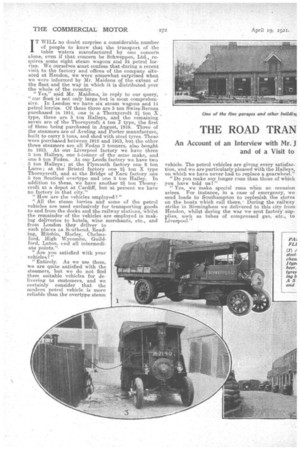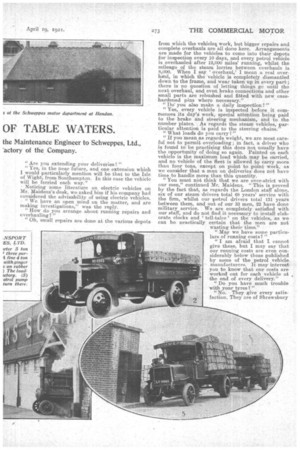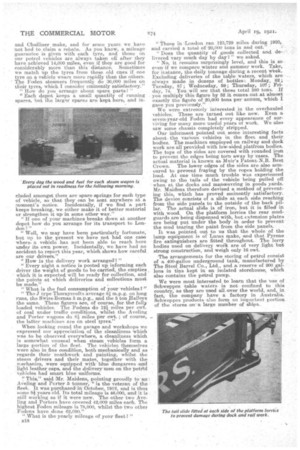THE ROAD TRAN OF TABLE WATERS.
Page 12

Page 13

Page 14

If you've noticed an error in this article please click here to report it so we can fix it.
An Account of an Interview with Mr. J and of a Visit to the Maintenance Engineer to Schweppes, Ltd., 'actory of the Company.
IT WILL no doubt surprise a considerable number of people to know that the transport of the table waters manufactured by one concern alone, even if that concern be Schweppes, Ltd., requires seine eight steam wagons and 24 petrol lorries. We ourselves inust confess that during a recent visit to the factoryand offices of the company situated at Hendon, we were somewhat surprised when we were informed by Mr. Maidens of the extent of
the fleet and the way in which it is distributed over .• the whole of the country.
" Yes," said Mr. Maidens, in reply to our query, "our fleet is not only large but is most comprehensive. In London we have six steam wagons and 14 petrol lorries. Of these three are 5 ton Swiss-Bernas purchased in 1914, one is a Thornyeroft 24 ton X type, three are 5 ton Halleys, and the remaining seven are of the Thornycroft 4 ton 7 type, the first of these being purchased in August, 1919. Three of the steamers are of Aveling and Porter manufacture, built to carry 5 tons, and shod with steel tyres. These were purchased between 1912 and 1913, but the other three steamers am all Foden 3 tanners, also bought in 1913. At our Liverpool factory we have three 3 ton Halleys, one 5-tonner of the some make, and one 5 ton Foden. At our Leedb factory we have two 3 ton Halleys ; at the Plymouth factory one 2 ton Laere; at the Bristol factory one 24 ton X type Thornyeroft, and at the Bridge of Earn factory one 5 ton Sentinel overtype and one 3 ton Halley. In addition to these, we have another 24 ton Thornycroft at a depot at Cardiff, but at present we have no factory in that city."
" How are the vehicles employed?" " All the steam lorries and some of the petrol vehicles are used exclusively for transporting goods to and from the docks and the railway stations, whilst the remainder of the vehicles are employed in making deliveries to hotels wine merchants, etc., and from London they deliver to such places as Southend, Reading, Hitehin, Horley, Chelmsford, High Wycombe, Guildford, Luton, end all intermediate points."
"Arc you satisfied with your vehicles?"
"Entirely. As we use them, we are quite satisfied: with the steamers, but we do not find them suitable vehicles for delivering to customers, and we certainly consider that the modern petrol vehicle is more reliable than the overtype steam vehicle. The petrol vehicles are giving every satisfaction, and we are particularly pleased with the Halleys, on which we have never had to replace a gearwheel." "Do you make any longer runs than those of which you have told us?" "Yes, we Make special runs when an occasion arises. For instance, in a case of emergency, we send loads to Southampton to replenish the stares on the boats which call there, During the railway strike in Birmingham we delivered to this city from Hendon, whilst during the war we sent factory supplies, such as tubes of compressed gas, etc., to "Are you extending your deliveries'?" "Yes, in the near future, and one extension which I would particularly mention will be that to the Isle of Wight., from Southampton. In this case the vehicle will be ferried each way." • Noticing some literature on electric vehicles on Mr. Maidens's desk, we asked him if his company had considered the advisability of using electric vehicles. "We have an open mind on the matter, and are making investigations," was the reply. "How do you arrange about running repairs and overhauling?" "Oh, sniall repairs are done at the various depots
from which the vehicles.; work, but bigger repairs and complete overhauls aro all done here. Arrangements are made for the vehicles to come into their depots for inspection every 10 days, and every petrol vehicle. is overhauled after 12,000 miles' running, whilst the mileage of the steam lorries between overhauls is 8,000. When I say ' ov erhaul,' I mean a real overhaul, in which the vehicle is completely dismantled down to the frame, and wear taken up in every part; there is no question of letting things go until the next overhaul, and even brake connections and other small parts are rehashed and fitted with new casehardened pins where necessary."
"Do' you also make a daily inspection?"
"Yes, every vehicle is inspected before it commences its day' S work, special attention being paid to the brake and steering mechanism, and to the number plates. As regards the steam vehicles, particular attention is paid to the steering chains. "What What load's do you carry?"
"If you mean as regards weight, we are most careful not to permit overloading ; in fact, a driver who is found to be practising this does not usually have the opportunity of doing so again. Painted on each vehicle is the maximum load which may be carried, and no vehicle of the fleet is allowed to carry more than four tons, except on point to point work, as we consider that a man on deliveries doer not have time to handle more than this quantity.
"You must net think that we are over-strict with our men," continued Mr. Maidens. "This is proved by the fact that, as regards the London staff alone, six of our steam drivers total 68 years' service with the firm, whilst our petrol drivers total 131 years between them, and out of our 33 men, 22 have done military service. We are completely satisfied with our staff, and do not find it necessary to install elaborate clocks and ' tell-tales ' on the vehicles, as we can be practically certain that the men are not wasting their time." "May we have some particulars of running costs? " "I am afraid that I. cannot give these, but I may say that our running costs are even considerably -below those published by some of the petrol vehicle manufacturers. It may interestyou to know that our costs are worked out for each vehicle at the end of every delivery."
"Do you have much trouble with your tyres?" "No. They give every satisfaction. They are of Shrewsbury and Chatliner make, and for some years we have not had to claim a rebate. As you knew, a mileage guarantee is given with each tyre, and those on our petrol vehicles are always taken off after they have achieved 14,000 miles, even if they are good for considerably more than this distance. Sometimes we match up the tyres from these old ones if one tyre on a vehicle wears more rapidly than the others. The Aden steamers frequently do 30,000 miles on their tyres, which I consider eminently satisfactory." "How do you arrange about spare parts?" " Each depot keeps a small quantity of running mares, but tlse larger spared are kept here, and in., eluded amongst them are spare springs for each type of vehicle, so that they can be sent anywhere at a moment's notice. Incidentally, if we find a part keeps breaking, we either make it of better material or strengthen it up in some other way."
"If one of your machines breaks d'own at another depot haw do you arrange for its transport to London ? "
"Well, we may have been particularly fortunate, but up to the present we have not had one case where, a vehicle has not been able to reach here under its own power, Incidentally, we have had no accident to report this year, which shows how careful are our drivers."
"How is the delivery work arranged?"
"Every night a notice is posted up informing each driver the weight of goods to be earned, the empties which it is expected will be ready for 'collection, and the points at which deliveries and collections, must be made."
"What is the fuel consumption of your•vehieles? "
"The J type Thornycrofte average 6t m.p.g. on long runs, the Swiss-Bernas 5 m.p.g., and the 5 ton Halleys the same. These figures are, of course, for the fully loaded vehicles. The Pc-dens do 121 miles per cwt. of coal under traffic conditions, whilst the Aveling and Porter wagons do 81 miles per .ewt. ; of course, the latter machine's are on steel tyres."
When looking round the garage and workshops we expressed our appreciation of the cleanliness which was to be observed eveiywhere, a cleanliness Which is somewhat unusual when steam vehicles form a large. portion of the fleet.. The vehicles themselves were also in fine condition, both inechan1call3r and as regards their coaehwork and painting, whilst. the steam drivers and their mates, together with th.e ,mechanics, were equipped with blue dungarees -and light leather caps, and the delivery men on the peti+Ol -Vehiples had smart blue uniforms.
This," said Mr. Maidens, pointing proudly to-anA.veling and Porter .5 tanner, is the veteran of the fleet.. It was _purthasect in October, 1912, and is thus some *years old.. Tts total Mileage is 48,000, and it is still working as if it were new. The ether two Aveling and Porters have covered 42,000 miles each. The highest Peden mileage is 78,000, whilst the two other Fodens have done 62,000."
" What is the yearly mileage of yonr-fleet? " B18 "Those in -London ran 123,729 miles during 1920, and carried a total of -20,000 tons in and out.'
"Does the quantity of goods collected and delivered vary much day by day?" we asked.
" No, it remains surprisingly level, and this is so even if we compare winter and summer work. Take for inetance, the daily tonnage during a recent week. Excluding deliveries of the table waters, which are .
always made in dozens of bottles: Monday, 62; Tuesday, 87; Wednesday, 59; Thursday, 107; Fri day, 74. You will see that these total 380 tons. If you multiply this figure by 52 it oomes out at almost exactly the figure of 20,000 tons per annum, which I gave you previously."
We were extremely interested in the overhauled vehicles. These are turned out like new. Even a seven-year-old Foden had every appearance of surviving for many more useful years ot work. We also saw sonic chassis completely stripped.
Our informant pointed out some interesting facts aboutthe various, vehicles in the fleet and their bodies. The machines employed on railway and dock work are all provided with low-sided platfrom bodies. The tops of the sides are covered with rounded iron to prevent the edges being torn away by cases. The actual material is known as Muir's Patent N.B. Best Crown. The lower edges of the sides are also arm oured to prevent fraying by the ropes holding the load. At one time much trouble was experienced owing to the tails of the vehicle being pulled off when at the docks and manoeuvring in goods yards.
Mr. Maidens therefore devised a method of preventing this, which has proved eminently satisfactory. The device consists of a slide at each side, reaching from the side panels to the outside of the back pillar. The actual slide is of iron, but it is filled in with wood. On the platform lorries the rear mudguards are being dispensed with, but extension plates are being put under the bodY in order to prevent the mud tearing the paint from the side panels.
It was pointed out to us that the whole of the lamp equipment is of Lucas make, 'and that. Pyrene
fire extinguishers are fitted. throughout. The lorry bodies used on delivery work are of very light but strong construction, and weigh only 16 cwt.
The arrangements for the storing of petrol consist of a 400-gallon underground tank, manufactui-ed by The Steel Barrel Co., Ltd., and a reserve of 900 gallons in tins kept in an isolated storehouse, which also contains the petrol pump.
We were most interested to learn that the use of Schweppes table water a is not confined to this country, as they are used all over the world, and, in fact, the company have a factory in Australia. Schweppes products also form au important portion of the stores on a large number of ships.




























